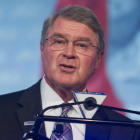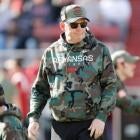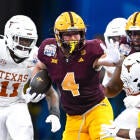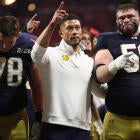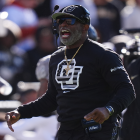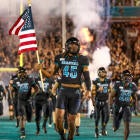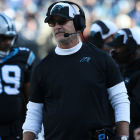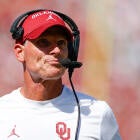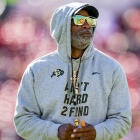TAMPA -- ACC commissioner John Swofford raised concerns Sunday about people who work within college sports helping to determine NCAA penalties against schools. The NCAA has used peer review on the Committee on Infractions for decades, including SEC commissioner Greg Sankey's current role as committee chairman while overseeing the panel for North Carolina's current academic fraud case.
"Greg per se? No, Greg's great," Swofford said when asked if he has concerns about Sankey on the infractions committee. "I have great respect for him. I think the structure itself, the whole structure -- and we've had it for years, it's nothing new -- of judging each other, that's a tough place to be. ... I think we need to look at the whole thing, not just conference commissioners (being on the committee). Should an AD? Should a conference president? Should faculty reps? Should coaches or former coaches, which are now on there? That's the nature of what we've had for a very long time and you don't necessarily change that in short order, we have found."
Swofford said former Miami AD Paul Dee used to tell him how uncomfortable it was serving as chair of the infractions committee with so many people mad at him. Dee oversaw the USC/Reggie Bush case.
Peer review "puts an awful lot of pressure on an awful lot of people, not just the ones under investigation, but the ones charged with overseeing it," Swofford said.
While not speaking directly about the North Carolina case, Sankey said he understood upon joining the infractions committee there will be difficulty and discomfort.
"I was placed on the Committee on Infractions by the Division I board of directors, and I think that's a reflection of the trust and confidence that people have had and continue to have in me and my judgment," Sankey said.
In the UNC case, the COI stepped in and clarified how it views impermissible academic assistance allegations. The NCAA enforcement staff then produced a third notice of allegations against North Carolina, causing Tar Heels athletic director Bubba Cunningham to complain the COI is inappropriately acting as "the investigator, the prosecutor and the judge." Questions were previously raised about why the second notice of allegations lacked more substance about the 18-year scandal in which UNC athletes took fake classes to maintain athletic eligibility.
Swofford declined to comment when asked if he's concerned about the COI's role in the UNC case, citing the fact it's ongoing. He said he has concerns with the length of the investigation and quipped that it's lasted "since the turn of the century."
Big Ten commissioner Jim Delany previously suggested the NCAA should outsource its investigations and penalties to an independent body that would mitigate tension from peer review. Delany said there was minimal support for the idea by the Collegiate Commissioners Association, a group of all 32 Division I conference commissioners.
"I thought it wasn't a bad idea personally, and I don't know if that idea is totally dead," Swofford said. "There's been some steps taken along the way where there are people from outside now on the infractions committee."
Among those with Sankey on the COI panel for UNC's case is former U.S. attorney general Alberto Gonzales. Sankey said those who want to outsource NCAA enforcement don't fully articulate what that means.
"I'm one who thinks there's value having people within intercollegiate athletics thinking through these really hard issues," Sankey said. "But keep in mind, we have a former U.S. attorney general on the Committee on Infractions. We've had individuals who have served in law practices over time and regulatory roles with the federal government."
ACC fines from Wake Forest scandal will be discussed. The ACC received criticism for its $25,000 fines to Louisville and Virginia Tech in the aftermath of the Wake Forest leak scandal. The fine for receiving plays in advance from a Wake Forest radio analyst was $5,000 less than Florida State coach Jimbo Fisher's penalty for criticizing officials after a game.
The ACC noted last month that $25,000 is the maximum fine allowed under the conference's bylaws. When asked Saturday if would have liked more discretion, Swofford replied, "Well, that's a hypothetical. I won't answer would I have. We'll see. I felt like that was sufficient up to this point. We'll probably have some conversation with our presidents and athletic directors going forward. It's something you hope you don't have to utilize very often."
Army, which was one of the schools involved in the so-called WakeyLeaks scandal, is still conducting an investigation. Tommy Elrod, the radio analyst who Wake Forest says leaked confidential information, hasn't publicly talked.
"I think we know everything we can possibly know," Swofford said. "If there's anything else to know, I'm not aware of it. If something else were to pop up, then obviously we would jump right back into it. Wake Forest brought in outside counsel to investigate it. They went through their findings in a very thorough way with us and we were very satisfied with that."
ACC may move championship game again. Swofford said the ACC is likely to move its football championship game out of Charlotte again unless North Carolina's so-called "bathroom bill" changes. The law limits protections for LGBT people, including requiring transgender people to use public restrooms based on the gender on their birth certificates.
"I don't see the (ACC's) principle changing, but I know there have been and continue to be discussions going on in North Carolina that could alter the current bill, and there is current litigation that could alter it," Swofford said.
Swofford said the ACC will have to decide sooner on the championship site than last year. The ACC followed the NCAA's lead in September by making the switch to Orlando, which Swofford said is a "viable option" for the game again if it moves. He noted the late move was hard on fans and more time is needed to market and promote a championship game.
Meanwhile, the ACC and SEC continued to play the Belk Bowl in Charlotte, when Arkansas and Virginia Tech played there in December.
"Our fans and our teams were appropriately accommodated," Sankey said. "We're using private facilities so those can be managed different than public facilities. We will continue that conversation (about whether the SEC stays affiliated with the Belk Bowl)."
Sankey gains authority for rescheduling games. Since the contentious talks to reschedule LSU-Florida this season, Sankey said SEC athletic directors have granted him authority to reschedule weather-impacted games. The SEC presidents and chancellors will discuss the issue at their March meeting and SEC bylaws could be changed in the spring.
"I think it's a very clear indication how our athletic directors view the commissioners' authority moving forward," said Sankey, who noted the idea is for the conference office to find solutions before the commissioner simply resolves disputes himself.
![[object Object] Logo](https://sportshub.cbsistatic.com/i/2020/04/22/e9ceb731-8b3f-4c60-98fe-090ab66a2997/screen-shot-2020-04-22-at-11-04-56-am.png)







